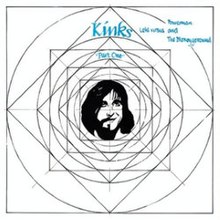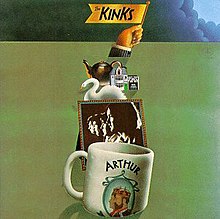QUEEN: QUEEN II (1974)
14/15
1. Procession; 2. Father to Son; 3. White Queen (As It Began); 4. Some Day One Day; 5. The Loser In the End; 6. Ogre Battle; 7. The Fairy Teller's Master Stroke; 8. Nevermore; 9. March of the Black Queen; 10. Funny How Love Is; 11. Seven Seas of Rhye
Best song: OGRE BATTLE
Every band has that album that, although it's one of the least known by the general public, is revered by a segment of fans, usually due to a combination of a small difference from a band's established sound (while still unmistakably them) and lack of radio hits. Just to throw out some random examples, for Pink Floyd, it's Animals, for Dire Straits it's Love Over Gold, for Genesis it could be basically any album from their first decade. For Queen, a group where every album from their third on has contributed a number of radio standards that have infiltrated the public conscious, that album is Queen II, and, true to form for such albums, it's one of their best. Like the debut, it's unmistakably Queen, but it's darker, heavier, and proggier than the Queen many are used to. Hell, this stuff could be considered prog metal, if such a term had existed in 1974. In fact, Queen were actually pioneers of that particular genre weird as that might sound, but consider the fact that Dream Theater has covered some of their early songs and it doesn't sound all that different. If only they'd covered "Bicycle Race" or something, now THAT would've been amusing. But I digress.
Anyway, this album is some short of concept album, what with Side 1 being the "White Side" (bluegrass) and Side 2 being the "Black Side" (hip-hop). Seriously, though, the only real concept seems to be that May's songs are all on the White Side, with Taylor's thrown in at the end, and Mercury gets the suite of sorts that makes up the Black Side. And I guess it all takes place in Rhye, and it's a battle of good and evil or something, it really doesn't matter. Queen lyrics as a whole don't really matter that much, just sit back and enjoy the ride.
After the minute-long "Procession," the album gets going with "Father to Son," a multi-parted monster from May with some great Freddie singing and some monstrous heavy riffing by Brian in the middle section, the song doesn't get boring at all despite lasting over six minutes. "White Queen (As It Began)" mellows things out a little with Freddie showing off his more tender side (he can pretty much sing anything, but thank God he never tried to rap), with more great guitar work (including some harder lines in the middle), and Brian gets his first lead vocal on "Some Day One Day." He's obviously no Freddie, but he has a good voice that provides a nice change of pace. He actually sounds closer to Freddie than Paul Rodgers, if you'll indulge me in beating that dead horse again. And at the end, there's actually three different guitar solos dubbed over each other! How cool is that? The White Side ends with Taylor's much-maligned "The Loser In the End," but I must admit that I absolutely love it. That echoey drum part at the beginning is worth the price of admission by itself, and the song, while admittedly somewhat derivative, does have a strong melody. It's actually one of the more single-ready songs on the album, if Roger hadn't sung it I'm sure it would've been released as one.
As great as the White Side is, though, Freddie's Black Side is where the real meat of this album is. The highlight is the opening "Ogre Battle," with an almost thrash riff and some more great singing. So what if it's about a goddamn ogre battle, which could theoretically sound fruity as hell, this song rocks like a motherfucker. And Freddie composed it on acoustic guitar? My mind is blown every time I read that. "The Fairy-Teller's Master Stroke" allows Mr. Mercury to indulge in some of his more...fey tendencies, and "Nevermore" is absolutely heartbreakingly sung even if, again, the lyrics don't fully make sense, but these two songs are basically the warm-up for "March of the Black Queen." I guess Freddie realized early in the writing period that he had about 12 different song ideas that weren't going anywhere, so he just kinda smashed them all together into six and a half minutes. This song had too many overdubs to play fully live (the uptempo section about 4 minutes in was part of a medley), but it's definitely the proto-"Bohemian Rhapsody" and is just as amazing as that implies. Freddie uses about six different voices, and the instrumentalists all do a great job switching between the sections. This includes Freddie, who's actually a damn good pianist--he wouldn't be a household name or anything, but he could've found work as a keyboard player. "Funny How Love Is" features more cool vocal overdubs, and then we finally get to the "hit" of the album (it was a bit of a flop, but it has since become beloved), "Seven Seas of Rhye" which I guess sums up everything that's happened on the side. The way the songs all run together gives the side a real sense of cohesiveness, even though in reality I suspect that they have fuckall to do with each other. Either way, it's a pretty amazing bit of music.
Even more than the debut, this shows off a side of Queen that radio listeners might not be familiar with, but is all the more worth checking out for it. There's not a single song that even approaches weak, and although it's hard to realize just how groundbreaking some of this must have sounded in 1974. One more thing--since I couldn't find anywhere else to mention him, props to John Deacon for his work on this album, contributing some great bass runs and also providing much of the acoustic guitar lines. He'll start writing next album, but for now, he's serving his purpose well. Proof that just because a band isn't technically a "democracy" that all the members can't have a large impact. Anyway, this is probably my second favorite Queen album, and it's nice for my music snobbery to realize that even though I'm listening to Queen, I'm still listening to songs none of my friends have ever heard.







